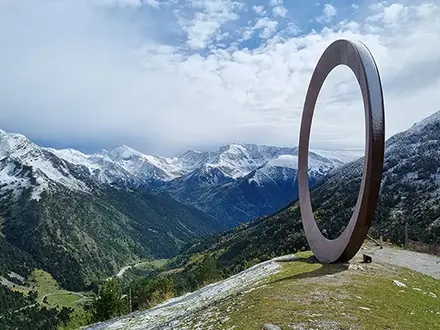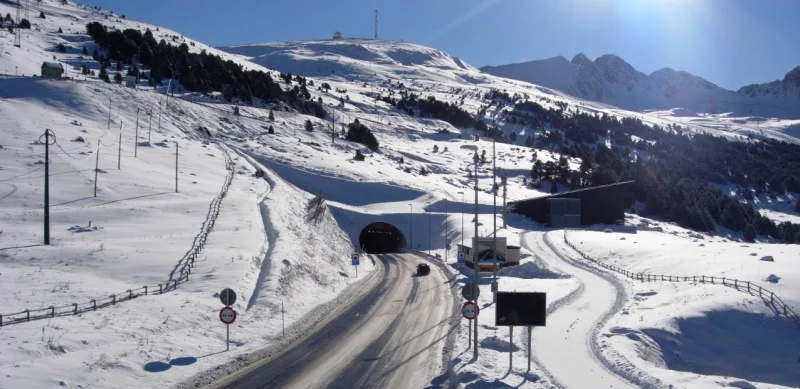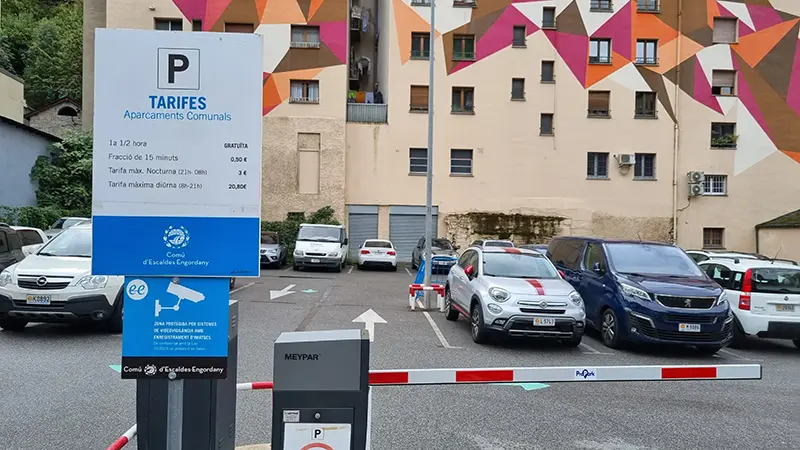
 Andorra
Andorra
- TitleColor: #333333
- DateColor: #999999
- SizeFont: 60
- FlagImg URL: /images/flags/Flag_of_Andorra.svg
- TitleImageSizes: 1900,1440,720
Andorra – Contents
General Information Toll Roads Speed Limits Petrol Parking Insurance Car Equipment TiresGeneral Information
Details about roads, speed limits, mandatory car equipment, and some traffic rules. More detailed information on toll roads, petrol prices, parking, speed limits, etc., can be found in the sections below.
| no road tolls, except for payment for passage through the Envalira tunnel | |
 |
urban area – 50 km/h outside urban area – 90 km/h dipped headlights at night and in poor visibility |
| maximum blood alcohol level 0.5 ‰ talking on the phone while driving – prohibited |
|
| winter tires mandatory in snow and ice, tire chains allowed only on snow or ice, studded tires allowed from November 1 to May 15 |
|
mandatory equipment:
|
|
| seat belts mandatory for all passengers child seat/booster required for children under 10 years and with a height under 150 cm |
Toll Roads
In Andorra, there are no highways, but there are 4 main roads. CG-1 connects the capital of Andorra with Spain to the south, and CG-2, through the Envalira tunnel, connects with France to the north.
There is no fee for using roads in Andorra. Only the passage through the Envalira tunnel is subject to payment.
Passage through the Envalira Tunnel

The Envalira Tunnel runs between the town of Pas de la Casa, near the border with France, and the famous ski resort of Grau Roig. The length of the tunnel is 2,879 meters. The lowest point of the tunnel is at 2,043 meters, and the highest is at 2,054 meters. It is one of the highest tunnels in Europe. The Envalira Tunnel has two lanes (one in each direction), and the maximum speed is limited from 40 to 70 km/h.
Envalira Tunnel on Google Maps
| Vehicle | Height and Weight | Tariff | |
|---|---|---|---|
  |
Cars (and with a trailer). | Height up to 2 m, weight up to 3.5 tons | € 7.80 |
  |
Vans, cars with a trailer | Height 2-3 m, weight up to 3.5 tons | € 13.70 |
 |
Trucks and buses | Height more than 3 m, weight more than 3.5 tons and two axles | € 15.70 |
 |
Motorcycles (and with a sidecar) | - | € 4.70 |
For drivers of cars paying for passage through the tunnel within one month from the same bank card, there are discounts depending on the number of tunnel passages. For example, from 6 trips, there will be a 10% discount, and for more than 40 trips, there will be a 50% discount.
More information about toll rates on the Envalira Tunnel website
Speed Limits

Standard speed limits in Andorra (unless otherwise indicated on the signs).
Cars and motorcycles:- in urban areas – 50 km/h
- outside urban areas – 90 km/h
- in urban areas – 50 km/h
- outside urban areas – 90 km/h
Low Beam Light
Low beam light is not mandatory during the daytime. Low beam light should be turned on in conditions of poor visibility caused by bad weather. Fog lights are allowed to be used only in case of fog, snow, or heavy rain.
Gasoline Prices in Andorra
Parking in Andorra

We recommend booking a hotel or apartment with parking right away, as all parking lots in the capital Andorra la Vella are paid.
Free parking in Andorra is located outside the city center. Therefore, if your priority is to leave the car near the shopping street or the center of Andorra la Vella, you won't be able to do it for free. Also, in places where many people go, such as gondolas and chairlifts, stations, ski resorts, or large hotels.
To park for free in Andorra in a completely legal way, you will have to drive to the outskirts, looking for streets with little traffic, which may not even have parking lanes, where cars are left on the side of the road. In these places, you can find free parking, and no one will bother you, but yes, it's outdoors, and you will definitely have to walk for some time to get to your destination. Authentic examples in Andorra la Vella can be certain streets:
Parking in the Blue and Green Zones in Andorra
Open street parking works by color. Lines painted in a certain color imply a set of rules and requirements for their use. Thus, you can distinguish the blue zone and the green zone. However, parking in blue and green zones is a matter regulated by each region. Thus, there are different prices and rules depending on the parking location.
In Andorra la Vella, there are about 900 parking spaces in the green zone (priced at 0.5 euros per hour) and 150 in the blue zone (priced at 1 euro per hour).
| Green Zone | Blue Zone | |
|---|---|---|
| Paid hours | Monday-Saturday 09:00-13:00 and 15:00-20:00 | Monday-Saturday 09:00-13:00 and 15:00-20:00 |
| Price per hour | € 0.50 | € 1.00 |
| Maximum stay time | 5 hours (€ 2.50) | 2.5 hours (€ 2.50) |
In Andorra la Vella, on parking lots, the price is 12 euros per night and 24 euros for the whole day. When booking a hotel or apartment, you can calculate that you will be more profitable with cheaper accommodation without parking and 24 euros per day for parking, or more expensive accommodation with parking.
Map with free spaces in Andorra la Vella: https://sit.andorralavella.ad/aparcaments/
In other regions, the rules are similar, and you will find information on road signs. Parking near ski resorts may be paid in the season and free from spring to autumn.
Mandatory Equipment
Equipment required to have in the car:| Reflective vest | |
| Emergency stop sign | |
| Spare bulbs | |
| Spare wheel and tools for its replacement |
| First aid kit | |
| Fire extinguisher |
Winter Tires, Studded Tires, Chains
| Using winter tires in Andorra is mandatory if the road is fully or partially covered with snow or ice. Law enforcement officials have the right to prohibit the movement of vehicles whose tires do not meet winter road conditions and may pose a danger to other road users. | |
| Using chains is only allowed if there is snow or ice on the road. | |
| Using studded tires is allowed from November 1 to May 15. |
 travels
travels Albania
Albania Austria
Austria Azerbaijan
Azerbaijan Belarus
Belarus Belgium
Belgium Bosnia and Herzegovina
Bosnia and Herzegovina Bulgaria
Bulgaria Croatia
Croatia Cyprus
Cyprus Czech Republic
Czech Republic Denmark
Denmark Estonia
Estonia Finland
Finland France
France Georgia
Georgia Germany
Germany Greece
Greece Hungary
Hungary Iceland
Iceland Ireland
Ireland Italy
Italy Kosovo
Kosovo Latvia
Latvia Liechtenstein
Liechtenstein Lithuania
Lithuania Luxembourg
Luxembourg Malta
Malta Moldova
Moldova Monaco
Monaco Montenegro
Montenegro Netherlands
Netherlands North Macedonia
North Macedonia Norway
Norway Poland
Poland Portugal
Portugal Romania
Romania Russia
Russia San Marino
San Marino Serbia
Serbia Slovakia
Slovakia Slovenia
Slovenia Spain
Spain Sweden
Sweden Switzerland
Switzerland Turkey
Turkey Ukraine
Ukraine United Kingdom
United Kingdom